The sky was not yet bright, but many people were already looming on the Tuy Hoa sea. Mr. Nam Chien (78 years old, in Tuy Hoa ward) has spent more than half his life with a small boat and a net, quietly preparing for the first trip of the day with his fellow sailors. The salty sea breeze, the smell of fish and engine oil mixed in the air, creating a familiar smell for the fishermen in this coastal area.
“I’m used to this job, I can’t stand it if I don’t go,” Mr. Chien said, constantly checking his net. When the clock struck 4 o’clock, he and his crew pushed the boat into the water. The loud sound of the engine tore through the night, and the small boat cut through the waves to head out to sea.
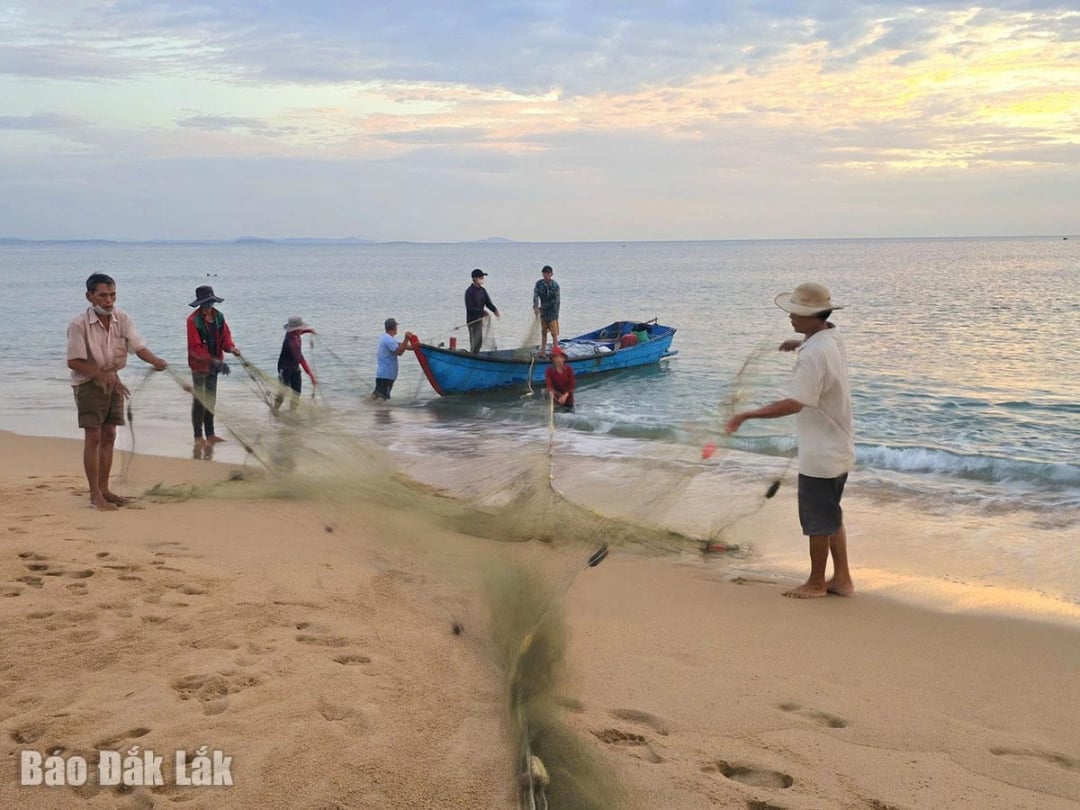 |
| Fishermen in Tuy Hoa ward prepare their nets to go fishing early in the morning. |
“Every day, my fellow fishermen and I wake up at 3am, prepare our gear, and go fishing. From 4am to 8am, we rotate two trips. Some days we catch fish, some days we don’t, but we go almost every day,” Mr. Chien said, his eyes still looking out to the sea. For more than 40 years in the profession, for Mr. Chien, the sea is not only a place to make a living, but also a home, a friend, a place where he shares all the joys and sorrows of life.
Mr. Chien's boat is small and only goes close to shore. Every day, he and his fellow boatmen cast their nets and catch spearfish, barracuda, anchovies, shrimp, squid, etc., and sometimes even mackerel and tuna. As soon as the boat reaches shore, his wife takes the opportunity to sort and select good fish to sell to early-birds or deliver to coastal restaurants. On a good day, each boatman gets 80,000 - 100,000 VND; on a bad day, they return empty-handed, considered a loss (cost of the trip).
“This way, we earn some money, not enough to survive. We don’t have much capital, so we only go close to shore. Only those with money can buy big boats to catch tuna far from shore,” Mr. Chien said, his eyes still fixed on the sea that was just turning pink with the dawn light.
Not only in Tuy Hoa, many coastal fishing villages in the East of Dak Lak also start a new day with the sound of waves and the sound of motorboats and motorboats echoing across the shore. In My Quang Bac village (Tuy An Nam commune), Mr. Nguyen Tam and his wife, Mrs. Ho Thi Thu Tuyet, have been attached to the sea for more than 35 years. Their luggage is a small motorized boat and a few worn-out nets.
“Working at sea is unpredictable. Some days you catch a lot, other days you only catch a few kilos of fish. Fish depends on the season, like this season it’s anchovies,” Mr. Tam said as he folded each net to prepare for the next trip.
Every day, Mr. Tam wakes up at 2am, pushing his motorboat out to sea while it is still dark. The night sea is vast, with only the sound of the wind blowing and the flickering lights from the boats in the distance. Although he is used to it, he is still not subjective because the sea is unpredictable. There are days when the sea is suddenly rough, the waves hit hard, the motorboat sways and almost capsizes. Once, the engine broke down in the middle of the journey, and he had to call someone from the shore to come and rescue him.
At around 5am, when the sun had just risen above the sea, he returned to shore. In the pale yellow sunlight, the net was pulled up, sparkling with fresh fish and shrimp - gifts from the sea after so much hard work. On shore, Mrs. Tuyet was also busy preparing baskets, ready to receive the fish, classify them, and sell them to familiar traders.
“Every time my husband goes to sea, I can’t sleep, I’m always worried because the ocean is so vast. But over time, I’ve gotten used to it. I’ve been working at sea for decades, how can I quit now?”, Ms. Tuyet said, her hands still nimbly removing each anchovy caught in the net.
Making a living on the water, fishermen not only face dangers at sea but also have to shoulder the burden of increasingly high costs: from gasoline, fishing gear, to machine repair, boat and basket maintenance. Meanwhile, fish prices fluctuate erratically, sometimes falling sharply, causing the effort of going out to sea all night to only be worth a few tens of thousands of dong. Many poor families do not have enough capital to build new boats and buy nets, so they have to accept small-scale work around the shore, with income fluctuating with each tide. However, despite everything, they still cling to the sea, loyal to the sea. They accept hardships, accept losses to keep their profession, keep the sea, and keep the way of life left by their ancestors.
| Every morning, when the sun has just risen, small boats follow each other to cut through the waves and head out to sea. And the rhythm of life continues - peaceful and simple like the people who are attached to the sea. That is the rhythm of life of those who make a living by the waves, where each mesh of the net not only holds fish but also preserves the memories and soul of the fishing village. |
My Quang Bac village - a nearly 200-year-old fishing village, currently has more than 780 households, most of whom make a living by fishing near the shore. The small boats and boats with just enough capacity to go out to sea are valuable assets, the "fishing rod" of many generations of fishermen here. Mr. Nguyen Hoang Yen, Head of My Quang Bac village, said: "People in the village have been fishing since their grandparents' generation, and now their children and grandchildren still do. Almost everyone here knows how to pull nets, mend nets, and know the smell of fish from a young age. There are families that have never left the sea for three generations."
According to Mr. Nguyen Hoang Yen, although the fishing profession is hard, it is in the blood. Fishermen do not only go to sea to earn a living, but also because they love the sea. The nets hanging in front of the house are not only fishing tools, but also a symbol of hard work and memories of generations attached to the sea.
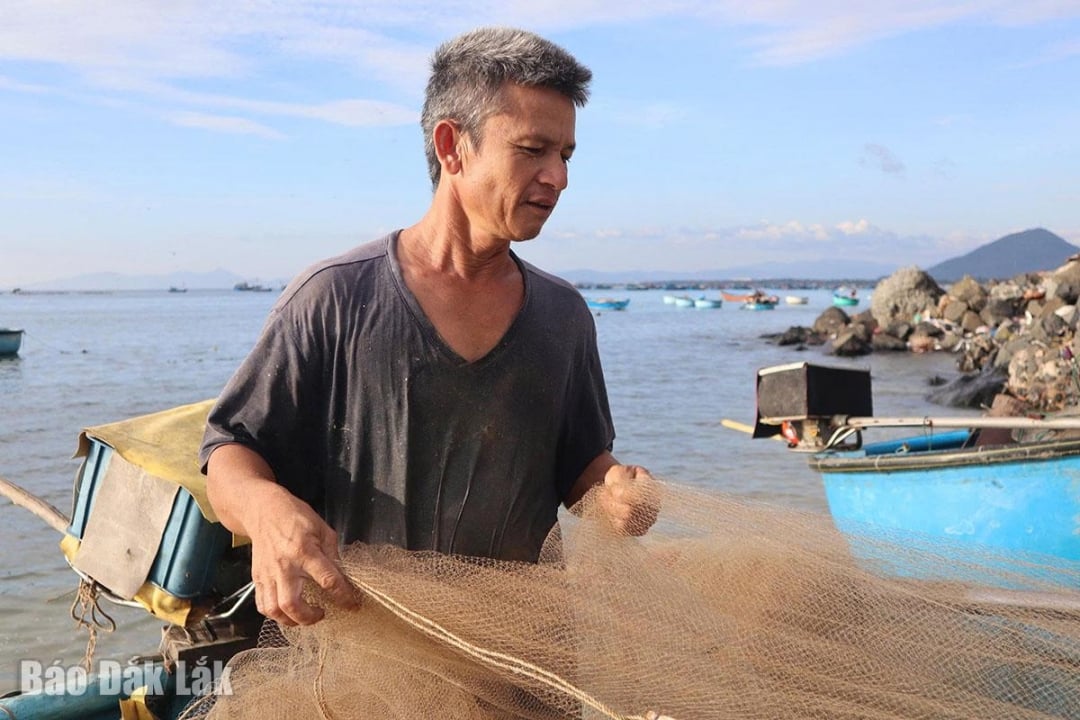 |
| Despite unstable income, fishermen in the eastern fishing villages of Dak Lak still strive to stay at sea and keep their jobs. |
There are days when the sea is rough and the fishing village is strangely quiet. There is no sound of engines, no sound of people shouting to each other to pull in the nets. But then, as soon as the sea is calm again, the villagers invite each other to go out to sea. Even though they know that fishing is hard work and income is uncertain, they still do not leave their nets. Because this profession has fed many generations, taught them patience, loyalty, and the courage to overcome difficulties.
“In this profession, as long as you have the strength, you can still go to sea. As long as you can hear the sound of the waves and smell the salty wind, you can still go to sea,” said Mr. Nam Chien, as a firm affirmation of a man who has never surrendered to the sea all his life. Mr. Nguyen Tam smiled gently: “The sea gives us life. We avoid the rough sea, and welcome the gentle sea. The sea does not make us rich, but it can support us, our wives and children. The sea will not disappoint those who love it.”
Amidst the constant changes of life, fishermen in the eastern sea of Dak Lak still quietly maintain their traditional profession. Not only to make a living, but also to preserve a part of the soul of the fishing village - a place with waves, wind and warm human love like the ocean.
Source: https://baodaklak.vn/xa-hoi/202508/luoi-ca-nhip-doi-6cf0a4e/





![[Photo] Parade blocks pass through Hang Khay-Trang Tien during the preliminary rehearsal](https://vphoto.vietnam.vn/thumb/1200x675/vietnam/resource/IMAGE/2025/8/27/456962fff72d40269327ac1d01426969)


![[Photo] Images of the State-level preliminary rehearsal of the military parade at Ba Dinh Square](https://vphoto.vietnam.vn/thumb/1200x675/vietnam/resource/IMAGE/2025/8/27/807e4479c81f408ca16b916ba381b667)






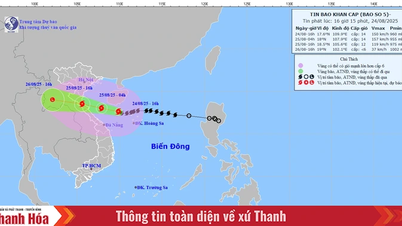
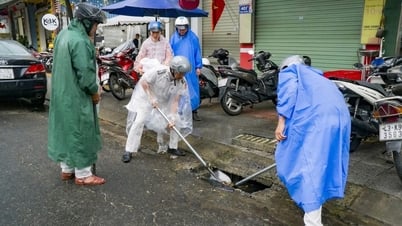










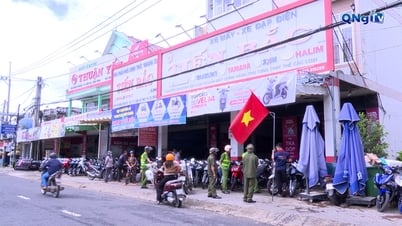





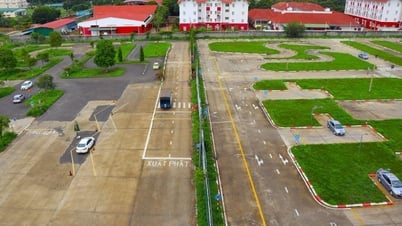







































































Comment (0)